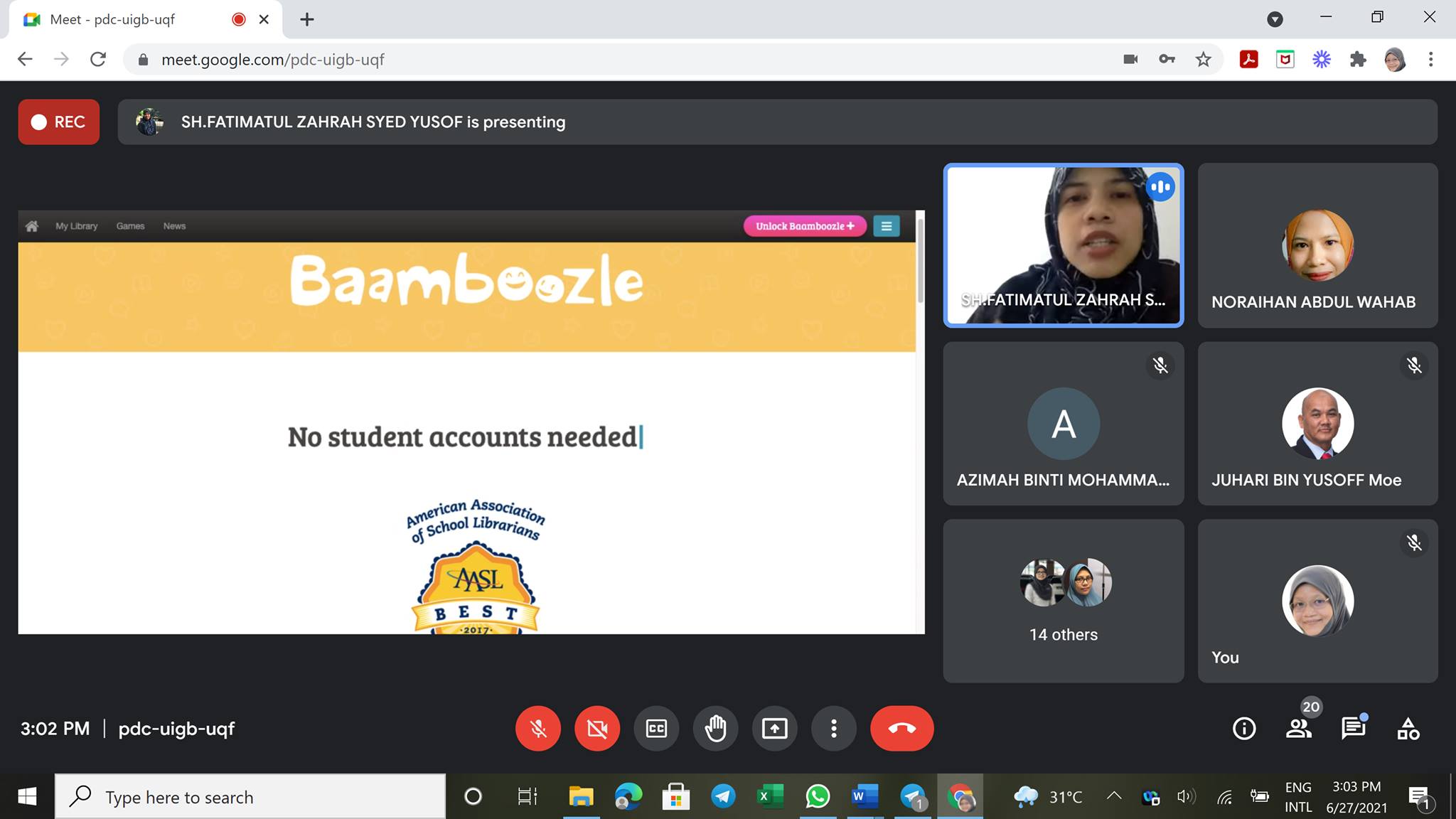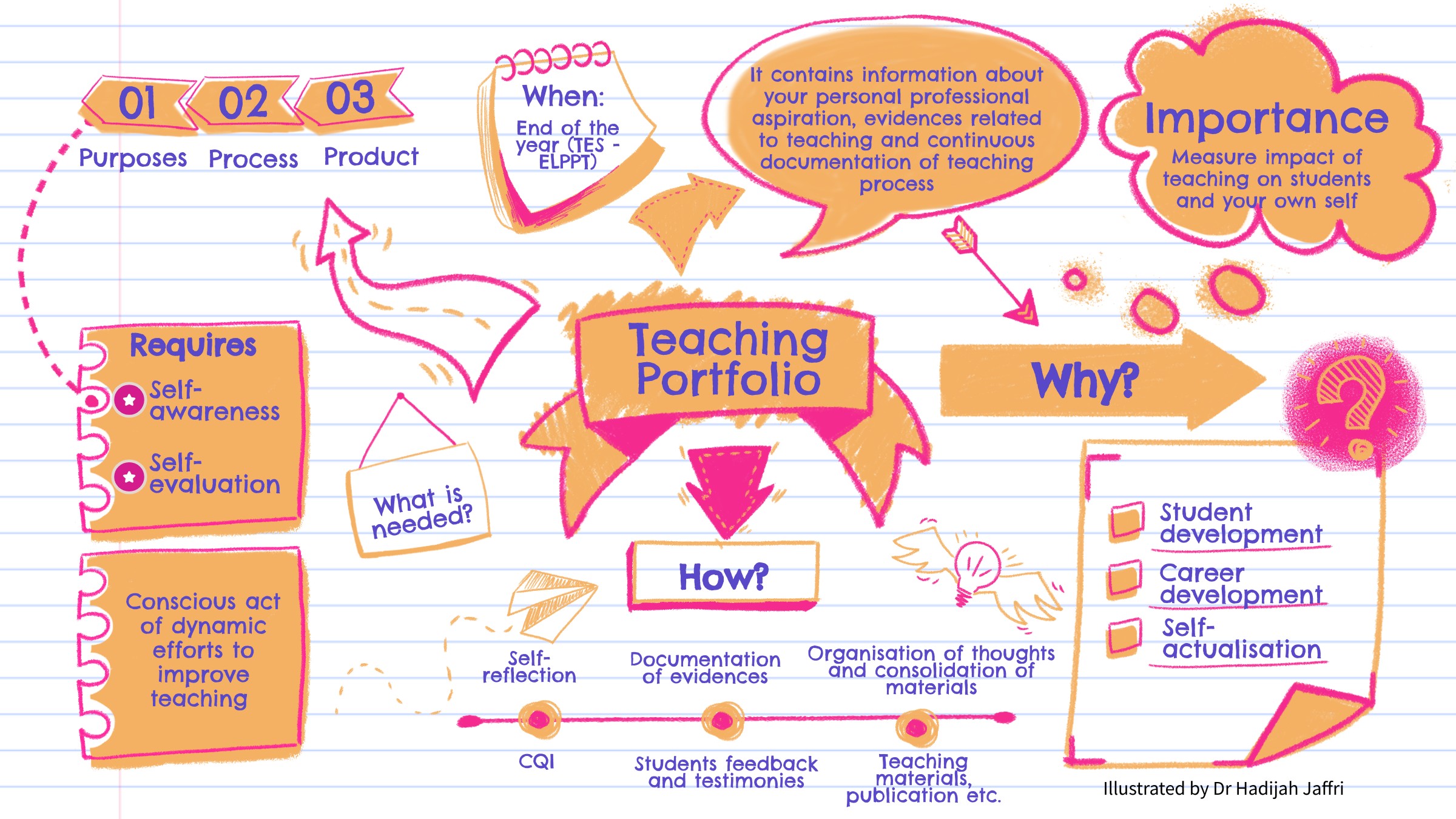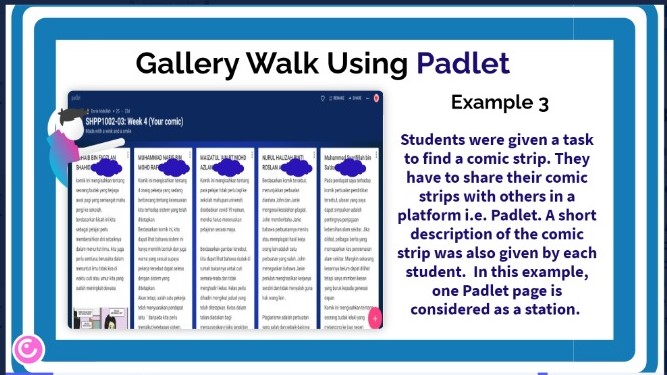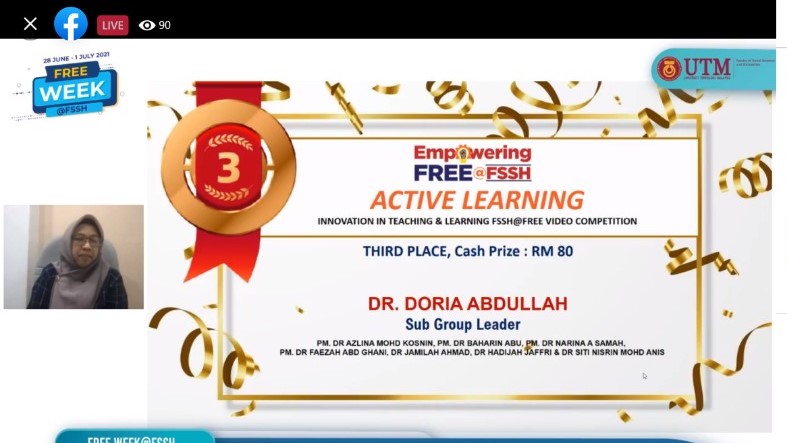Siri Masterclass Premium PEMIMPIN GSL SLOT KE-2, tajaan Yayasan Sime Darby berlangsung pada hari Sabtu, 21 Ogos 2021 pada jam 2 hingga 5 petang. Pada mulanya aku rasa tak nak datang ke sesi ini tapi aku kuatkan semangat. Lepas makan panadol, minum air dan sambil baring aku cuba hadir ke sesi ini. Oleh kerana tulisan tangan aku semakin teruk, untuk mengambil nota, aku bercadang untuk menaip terus tips yang aku pelajari dari sesi ini di sini. Ramai yang hadir ke sesi ini. Melebihi 100 orang peserta. Aku dengan Dr Doria je dari UTM. Kami bercadang untuk menghadiri sesi ini untuk belajar sesuatu yang baru dari orang luar UTM. Kami kena sedar diri bahawa tak semestinya orang luar dari UTM tak pakar dalam hal pentaksiran PDPR.
Penceramah ialah Samuel Isaiah (Global Teacher Prize Top 10 Finalist 2020). Fulbright scholar. Guru di SK Runchang, Pahang. (if you don’t know him, can google him).
Ini adalah tips yang saya pelajari pada sesi ini
- Menerangkan etika sesi dalam talian
- Menyatakan “Words of Affirmation”. Cikgu Sam menggunakan akronim “S – Smart, A – Amazing, M – Marvellous”. Cuba jadikan ini sebagai amalan setiap kali sesi pengajaran dan pembelajaran.
- Memberikan agenda sesi (secara ringkas)
3 langkah merancang pentaksiran formatif (backwards planning, penetapan jangka masa, pemilihan strategi pentaksiran)
- Backwards Planning
Selalunya perancangan PdP/PdPR dimulai dengan mengenal pasti topik, merancang beberapa pengajaran untuk mengajar dan menentukan jenis bukti dan strategi pentaksiran.
Backward planning ditentukan dengan mengenal pasti hasil yang dikehendaki (end goal), mementukan jenis bukti dan strategi pentaksiran dan merancang pengajaran untuk menyedikan murid melengkapkan pentaksiran. (RPH dirancang akhir sekali. Tentukan dulu hasil yang dikehendaki – apa yang kita hendak murid belajar).
Proses berbalik ini dapat membantu guru dalam mencipta urutan (sequence) untuk sesi PdP/PdPR. Hasil yang ingin dicapai ditentukan terlebih dahulu.
Backwards planning dapat membantu guru dalam mencipta dan mereka proses perjalanan PdP yang berfokuskan kepada proses pembelajaran dan bukan pengajaran semata-mata dan menintegrasi standard pembelajaran dan standard prestasi.
Formula backwards planning: HER
H – Hasil yang dikehendaki (dalam DSKP – hasil pembelajaran). Apa yang saya mahu murid saya dapat atau faham?
E – Evidence. Bukti apa yang dikehendaki. Bagaimana saya akan tahu murid tahu? Apa yang saya mahu murid tahu? (pemilihan jangka masa, pemilihan strategi)
R – Rancangan pengajaran. Apa yang perlu saya buat dalam sesi pembelajaran untuk menyediakan murid untuk penilaian? Penyediaan RPH (lesson plan)
Bagaimana memaksimakan impak backwards planning?
- Melibatkan murid-murid dalam perancangan dan membuat keputusan bersama.
- Membina jaringan dan kerjasama dengan guru-guru lain (Practitioner Learning Community -PLC). Merancang bersama, mendapatkan maklum balas.
- Merancang secara nyata dan membuat carta alir supaya mendapat melihat, merasa dan menjiwai rancangan anda (guna papan putih, jamboard, sticky note dsb). Visualisasi perancangan anda.
2. Penetapan jangka masa
Kenal pasti jangka masa: jangka masa pendek, jangka masa sederhana dan jangka masa panjang.
Jangka masa pendek: sewaktu sesi pembelajaran, minit ke minit, hari ke hari. Strategi: Quick scan, questioning, discussions, self & peer assessment. Kelebihan: meningkatkan keterlibatan murid dan responsif/reaksi guru bertambah baik.
Jangka masa sederhana: di antara konsep penting di dalam satu unit/topik. 1 hingga 4 minggu. Strategi: projects, assignments, journals, practice test/quiz. Kelebihan: murid memahami bagaimana mereka dinilai dan pemahaman guru berkaitan dengan penilaian meningkat.
Jangka masa panjang: 4 minggu hingga setahun. Strategi: benchmarking test, end of year exam. Kelebihan: Penanda aras untuk kemajuan murid dan penambahbaikan terhadap kurikulum dibuat.
3. Pemilihan strategi pentaksiran
Teknik Quick scans: teknik membolehkan guru memeriksa kefahaman semua murid dengan cepat pada seluruh kelas. Jangka pendek dan sederhana. Cara: traffic light, thumbs up/down, sideways. whiteboard.
Teknik effective questioning: Menggunakan pelbagai jenis teknik penyoalan untuk mendapatkan respons dan menilai kefahaman murid. Jangka pendek dan sederhana. Cara: Hinge question, wait time, whiteboard, art, rhymes or actions, randomised or nominated question, socratic questions (soalan bersifat mencungkil yang memerlukan murid menggunakan KBAT. Contoh: the ignoramus: berpura-pura tidak tahu atau tidak peduli untuk mendorong penjelasan atau huraian daripada murid, the stingray: beri kejutan kepada cara berfikir tradisional murid-murid, the gadfly: melibatkan banyak bertanya soalan-soalan kecil, the midwife: mengemukakan soalan yang membantu untuk melahirkan idea),
Self and peer assessment: Jangka masa pendek dan sederhana. The entrance and exit ticket, star-triangle-circle, two stars and a wish , simple check, one-minute reflections
Communication regulators: High tech (low and no tech – cannot be done). Cara: Talking chips, timed turns, hot seat, think-pair-share.
2 perkara yang ingin saya pelajari dari sesi ini: a) pelaksanaan penilaian formatif dalam sesi PDPR, b) teknologi penilaian formatif dalam sesi PDPR
Untuk cikgu yang berminat , ini laman web – https://pemimpingsl.org/. Selain daripada itu, laman social media Pemimpin GSL
Instagram – https://www.instagram.com/pemimpingsl/
Facebook – https://www.facebook.com/pemimpingsl
Apa itu Penilaian formatif?
Penilaian: Mendapat kepastian atau rumusan mengenai apa yang murid tahu atau mampu lakukan. Rumusan (kepastian) ini berdasarkan bukti (evidence) pembelajaran yang dihasilkan oleh murid-murid.
Formatif: Sesuatu yang membantu, mereka atau membentuk (form or shape). Perkataan formatif itu sendiri merujuk kepada tujuan penilaian. Di mana ia dilaksanakan untuk membentuk dan memaklumkan pengajaran dan pembelajaran (to improve). Memperbaiki pengajaran kita, pembelajaran murid dan tindakan (intervensi) seterusnya.
Penilaian menjadi formatif apabila guru dan murid menggunakan bukti (evidence) mengenai pembelajaran murid, untuk membantu mereka: a) memahami perkembangan murid, dan b) menentukan langkah seterusnya dalam pengajaran dan pembelajaran. Keputusan yang dibuat berlandaskan aspek-aspek dan bukti adalah lebih berkesan berbanding keputusan yang tidak berasaskan bukti.
Cikgu Sam “Process of learning is meaningful and memorable than results” – Keputusan murid yang tidak memberangsangkan tidak membanggakan tetapi proses pembelajaran yang murid lalui itu membanggakan.
Pentaksiran tentang pembelajaran (assessment of learning) = pentaksiran sumatif
Pentaksiran untuk pembelajaran (assessment for learning) = pentaksiran formatif
Direka untuk individu yang tidak terlibat secara langsung dengan PdP harian = pentaksiran sumatif
Perlu melibatkan murid kerana murid adalah sasaran untuk peningkatan dalam pembelajaran.
Cabaran-cabaran melaksanakan pentaksiran sewaktu PdPR.
- Guru kekurangan kebolehan untuk merancang dan mengintegrasikan pentaksiran efektif dalam PdPR.
- Murid tidak terlibat sewaktu PdPR dan kekurangan komunikasi dua hala.
- Masalah infrastruktur.
- Guru kekurangan kemahiran dan pendedahan kepada strategi pentaksiran yang berbeza.









